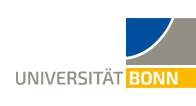
Introduction
Theoretical approaches play an important role for the molecular design of organic electronic devices. Considering the scope of TIDE, we have distinguished three areas. In Templating process, we start with the clean surface of the template, followed by a subsequent filling of this surface with Molecular Building Blocks. In Bulk properties, we address thin-film properties related to variations in the nano-morphology, taking into account the possible dimerization of pi-conjugated molecules, and the formation of H- or J-aggregates. In Charge carrier and energy transfer dynamics, we want to compute steady-state charge and excitonic transport as a function of the order parameter.
ABOUT TIDE

